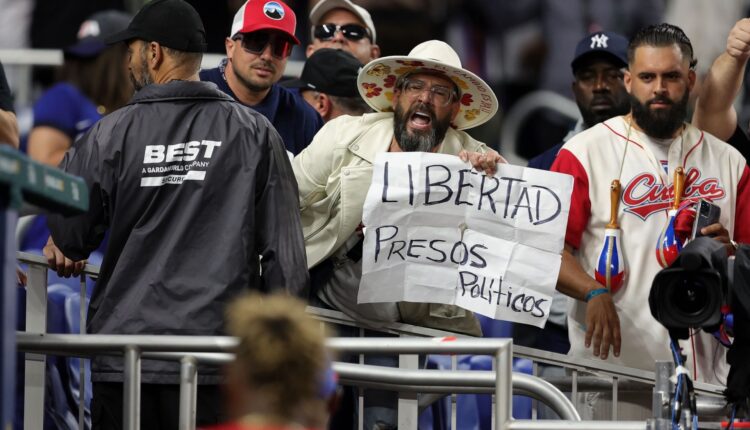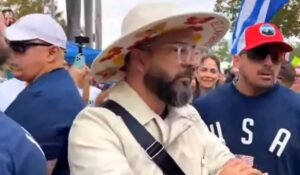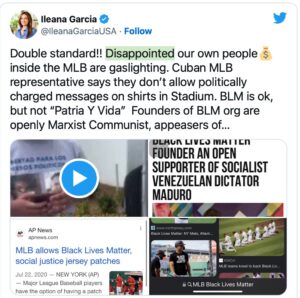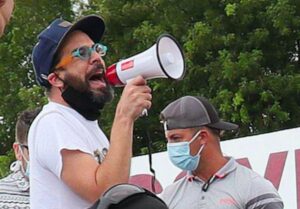
What the anti-Cuba protest at the WBC was really about (+Español)
By Arturo Domínguez / Latino Rebels
The World Baseball Classic closed in Miami on Tuesday after Japan [defeated] the United States for bragging rights on the world stage.
On Sunday, the U.S. played the Cuban national team in a semifinal game to a mixed crowd of fans of the game and protesters against the Cuban regime. The goal of the demonstrations was presumably to bring awareness to Cuba’s totalitarian regime, but it isn’t being discussed outside of the Cuban American community for two reasons: First, Major League Baseball, which oversees the tournament, made efforts to avoid politicizing the match-ups, and, second, the much of the protest wasn’t genuine.
The shameless self-promotion among anti-communist Cubans became anti-Cuba protests prior to the game outside of LoanDepot stadium. It didn’t take long to see and hear what the motivations of many protesters were, and it wasn’t about saving Cuba from anything. It seemed to be more about making the archipelago another U.S. territory, on the one hand, and the destruction of an island nation that has never known true independence or freedom since the majority of Cuban dictators were installed by the United States and Cuba’s 60-plus years of independence has been dominated by the U.S. embargo.
What we saw in the online videos posted to social media was nothing more than virtue-signaling. While virtue-signaling isn’t always bad, it does have a negative effect when it’s not followed by meaningful action. And that’s what we saw during Cuba’s matchup with the United States: nothing but shameless self-promotion among self-proclaimed activists acting more important than they are.
The open racist Alex Otaola

This brings us to Alex Otaola. The openly racist, once progressive, and self-proclaimed anti-Castroist likes to promote himself as if he’s having an impact on Cuba. And in one sense, he is—just not like he thinks.
Most Cubans on the island despise Otaola and, because of that, he’s driving more animus against the United States. Many Cuban Americans also detest him for his often intolerant political and social views. His platform encourages other Cuban Americans to espouse the same anti-Semitic and anti-Black talking points used by racists in the United States.
While it’s not clear whether he sees himself as the next Cuban leader, he definitely acts like he does. The thing is, not many outside of Cuban Facebook know him, and because all he does is talk badly about others and mock them, it’s doubtful that anyone will ever take him seriously.
And since he can’t seem to withstand criticism, commentary, or mockery about himself, that makes for a weak leader. Like every other far-right personality out there, he can dish it out, but he can’t take it.
I watched Otaola’s Facebook live broadcast on Monday, the day after the Cuba-U.S. game. It was riddled with accusations of Democrats being communists, a lot of talk about George Soros, and, of course, the comparisons of the plight of Cubans to Black Lives Matter (BLM). Comparing two issues with no connection or similarities make for a false equivalence, so Otaola’s pointing in making such a comparison is seemingly to attack BLM and paint the movement as communist and supported by “the Jews”—just like white supremacists do.
 During Otaola’s broadcast, Republican Florida state Sen. Ileana Garcia complained about security at LoanDepot Stadium denying entry to some Cubans who were wearing politically charged attire. Major League Baseball made it clear early on that it did not want to politicize the tournament, which lead to Garcia began making references to MLB embracing the BLM movement in 2020.
During Otaola’s broadcast, Republican Florida state Sen. Ileana Garcia complained about security at LoanDepot Stadium denying entry to some Cubans who were wearing politically charged attire. Major League Baseball made it clear early on that it did not want to politicize the tournament, which lead to Garcia began making references to MLB embracing the BLM movement in 2020.
Let’s be clear, dragging Black Lives Matter into anything related to Cubans is racist. Anti-Blackness in the Cuban diaspora is so pervasive that even some Afro-Cubans deploy it because they don’t consider themselves Black. But as they learn and embrace racist rhetoric and behaviors from the same racist Cubans that fled Cuba because of equal rights, they have to deal with racism in the Cuban American community.
The shunning of the Afro-Cuban community is the reason you see a majority of white Cubans using the most extreme rhetoric. Colorism in Latin America is a major issue, and for the Cuban American community, much of it has been brought from Cuba and integrated into the racist state here in the United States.
Proximity to whiteness is a powerful tool for bigots and their recruitment efforts. It drags people like Enrique Tarrio in, and they willingly embrace it.
As I have written countless times, many of the issues the Cuban American community tries to get engagement on are serious and should attract attention, but those issues are diminished within the U.S. population at large when employing racism and bigotry. The United States is a country that has yet to reckon with the plight of Indigenous and Black communities caused by the racist state.
But like the good little Trump supporters that many anti-Cuba protesters are, they don’t care. They think they’re being edgy. That’s what the protests at LoanDepot stadium were about. All they did was try to outshout each other, acting as if the one with the most extreme language wins.
It was like watching recess at a daycare and all their screaming —at the same time— made their message next to impossible to decipher. The loudest were the most bigoted, and no one wants to hear that.
The protest was about proximity to whiteness and self-promotion. Nothing more. Cubans on the island deserve better representation here than that.
Arturo Domínquez is a first-generation Cuban American, anti-racist, journalist, and the publisher of The Antagonist magazine.
*****
Versión en Español:
De qué verdaderamente se trató la protesta anticubana en el Clásico Mundial de Béisbol
El Clásico Mundial de Béisbol cerró en Miami el martes después de que Japón [derrotara] a Estados Unidos por el derecho a fanfarronear en el escenario mundial.
El domingo, Estados Unidos jugó contra la selección cubana en un partido de semifinales ante una multitud mixta de fanáticos del juego y manifestantes contra el régimen cubano. Presuntamente, el objetivo de las manifestaciones era crear conciencia sobre el régimen totalitario de Cuba, pero no se discute fuera de la comunidad cubanoamericana por dos razones: primero, Major League Baseball, que supervisa el torneo, hizo esfuerzos para evitar politizar el partido, y, en segundo lugar, gran parte de la protesta no fue genuina.
La autopromoción desvergonzada entre los cubanos anticomunistas se convirtió en protestas anticubanas antes del partido fuera del estadio LoanDepot. No pasó mucho tiempo para ver y escuchar cuáles eran las motivaciones de muchos manifestantes, y no se trataba de salvar a Cuba de nada. Parecía tratarse más de convertir el archipiélago en otro territorio estadounidense, por un lado, y la destrucción de una nación insular que nunca ha conocido la verdadera independencia o libertad desde que la mayoría de los dictadores cubanos fueron instalados por Estados Unidos y los más de 60 años de independencia cubana ha estado dominado por el embargo estadounidense.
Lo que vimos en los videos en línea publicados en las redes sociales no fue más que una señal de virtud falsa. Si bien la señalización de virtudes no siempre es mala, tiene un efecto negativo cuando no va seguida de una acción significativa. Y eso es lo que vimos durante el enfrentamiento de Cuba con Estados Unidos: nada más que autopromoción desvergonzada entre activistas autoproclamados que se creen más importantes de lo que son.
![]() El abiertamente racista Alex Otaola
El abiertamente racista Alex Otaola
Esto nos lleva a Alex Otaola. Al abiertamente racista, alguna vez progresista y autoproclamado anticastrista le gusta promocionarse como si estuviera teniendo un impacto en Cuba. Y en cierto sentido, lo es, pero no como él piensa.
La mayoría de los cubanos en la isla desprecian a Otaola y, por eso, está generando más animadversión contra Estados Unidos. Muchos cubanoamericanos también lo detestan por sus puntos de vista políticos y sociales a menudo intolerantes. Su plataforma alienta a otros cubanoamericanos a adoptar los mismos puntos de conversación antisemitas y antinegros utilizados por los racistas en los Estados Unidos.
Si bien no está claro si se ve a sí mismo como el próximo líder cubano, definitivamente actúa como si fuera. Lo que pasa es que no muchos fuera del Facebook cubano lo conocen, y como lo único que hace es hablar mal de los demás y burlarse de ellos, es dudoso que alguien lo tome en serio.
Y dado que parece que no puede soportar las críticas, los comentarios o las burlas sobre sí mismo, eso lo convierte en un líder débil. Como cualquier otra personalidad de extrema derecha, puede repartirlo, pero no puede soportarlo.
Vi la transmisión en vivo de Facebook de Otaola el lunes, el día después del encuentro Cuba-EE.UU. Estaba plagado de acusaciones de que los demócratas eran comunistas, se hablaba mucho de George Soros y, por supuesto, las comparaciones de la difícil situación de los cubanos con Black Lives Matter (BLM). Comparar dos temas sin conexión o similitudes genera una falsa equivalencia, por lo que el punto de vista de Otaola al hacer tal comparación aparentemente ataca a BLM y pinta al movimiento como comunista y apoyado por “los judíos”, tal como lo hacen los supremacistas blancos.
Durante la transmisión de Otaola, la senadora estatal republicana de Florida, Ileana García, se quejó de que la seguridad en el estadio LoanDepot les negaba la entrada a algunos cubanos que vestían atuendos políticamente cargados. Major League Baseball dejó en claro desde el principio que no quería politizar el torneo, lo que llevó a García a comenzar a hacer referencias a que MLB abrazaría el movimiento BLM en 2020.
Seamos claros, arrastrar Black Lives Matter a cualquier cosa relacionada con los cubanos es racista. La antinegritud en la diáspora cubana es tan generalizada que incluso algunos afrocubanos la despliegan porque no se consideran negros. Pero a medida que aprenden y adoptan la retórica y los comportamientos racistas de los mismos cubanos racistas que huyeron de Cuba por la igualdad de derechos, tienen que lidiar con el racismo en la comunidad cubanoamericana.
El rechazo de la comunidad afrocubana es la razón por la que se ve a una mayoría de cubanos blancos usando la retórica más extrema. El colorismo en América Latina es un problema importante, y para la comunidad cubanoamericana, gran parte de él ha sido traído de Cuba e integrado en el estado racista aquí en los Estados Unidos.
La proximidad a la blancura es una herramienta poderosa para los fanáticos y sus esfuerzos de reclutamiento. Atrae a gente como Enrique Tarrio, y lo abrazan de buena gana.
Como he escrito innumerables veces, muchos de los temas en los que la comunidad cubanoamericana trata de involucrarse son serios y deberían llamar la atención, pero esos problemas se ven disminuidos dentro de la población estadounidense en general cuando se emplea el racismo y la intolerancia. Estados Unidos es un país que aún tiene que tomar en cuenta la difícil situación de las comunidades indígenas y negras causada por el estado racista.
Pero como los partidarios de Trump que son muchos manifestantes anticubanos, no les importa. Ellos piensan que son innovadores. De eso se trataban las protestas en el estadio LoanDepot. Todo lo que hicieron fue tratar de gritarse unos a otros, actuando como si ganara el que usaba el lenguaje más extremo.
Era como ver el recreo en una guardería y todos sus gritos —al mismo tiempo— hacían que su mensaje fuera casi imposible de descifrar. Los más ruidosos eran los más intolerantes, y nadie quiere escuchar eso.
La protesta fue sobre la proximidad a la blancura y la autopromoción. Nada más. Los cubanos en la isla merecen una mejor representación aquí que esa.

 El abiertamente racista Alex Otaola
El abiertamente racista Alex Otaola